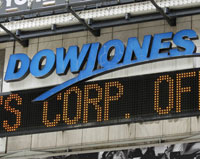Dow tumbles nearly 280 points due to Citi quarterly loss
U.S. stocks fell sharply on Tuesday, with the Dow industrials posting triple-digit losses by midday, as a record quarterly loss at Citigroup and weak retail sales data deepened concerns about the magnitude of the credit and housing crises.

Sales at U.S. retailers fell 0.4 percent in December and were less vigorous in November than previously thought, according to a government report that implied costlier energy and slumping housing prices were taking a toll on consumers.
But nervousness over the depth of the economic slowdown was exacerbated by Citigroup, the largest U.S. bank, which reported earnings-per-share losses nearly twice what was expected and slashed its dividend by 41 percent.
Citi also said it had fewer writedowns from the credit crisis than analysts had expected, although they amounted to a colossal $18.1 billion, Reuters reports.
Wall Street is worried that a hesitant consumer could mean the economy has little likelihood of avoiding a recession. Spending by consumers, which accounts for more than two-thirds of U.S. economic activity, has been key to staving off economic slowdowns in recent years.
Some investors are looking to economic readings such as those arriving Tuesday as well as lackluster quarterly results as bolstering an argument for sizable interest rate cuts from the Federal Reserve. Fed Chairman Ben Bernanke has dropped strong hints that a rate reduction is on the way. The Fed's monetary policy committee's next meeting is Jan. 29-30. The worrisome fall in retail sales, which also pressures the dollar, builds a case for the argument that the cut will be at least 0.50 percentage point.
Concerns about a weakening economy also were highlighted in the latest corporate results. Citigroup announced a hefty $18.1 billion write-down for bad mortgage assets early Tuesday and slashed its dividend.
The news of Citigroup's drastic efforts to shore up its balance sheet had been widely expected, but it still was a forceful reminder of the serious problems that bad lending practices have created for financial services firms, the AP report.
Citigroup and its predecessor companies use the "diversified financial services business model" first invented by Prudential in the late seventies. Simply put, this model attempts to conglomerate many types of finance companies, such as stock brokers, banks, insurance companies, and others. This is done because each of those businesses do better or worse at different times of the business cycle, and so owning all of them balances things out and creates in theory less earnings volatility. This is also done because customers usually use many different kinds of financial products and attempting to convince them to use more products from the same company sells more products more cheaply, compared to those separate companies strictly selling products on their own.
During the era of Sandy Weill, much of Citigroup and predecessor's efforts were focused on acquisitions. Much of the efforts were focused in the stock brokerage and investment banking areas, and most of the acquisitions were companies which had recently had problems and were selling at a low price. After the acquisition, the management team would usually engage in aggressive cost cutting to build up cash for the next deal.
Former CEO, Chuck Prince, has said "the day of the transformative deal (merger) is over". This is thought to refer to mega deals like the Citicorp/Travelers merger, as Citigroup continues to acquire. The focus of the company though, is said to have changed to organic revenue growth, that is selling more products instead of focusing on acquisitions and cost cutting alone to increase profit.
Citigroup's 2005 sale of the remainder of Travelers Insurance to MetLife was described by the press as the death knell of the bank-insurance cross-selling model. This is a false analysis though, as Citigroup continues to cross sell insurance, but no longer underwrites it. This focus on selling almost all kinds of financial products, but not necessarily "manufacturing them", is also what prompted Citigroup to recently trade its mutual fund business to Legg Mason in return for more stockbrokers.
Source: agencies
Subscribe to Pravda.Ru Telegram channel, Facebook, RSS!



